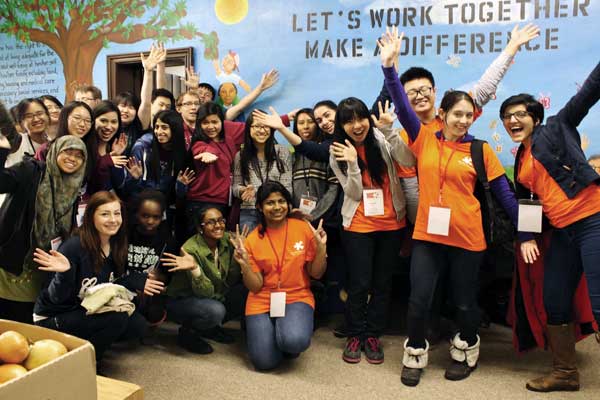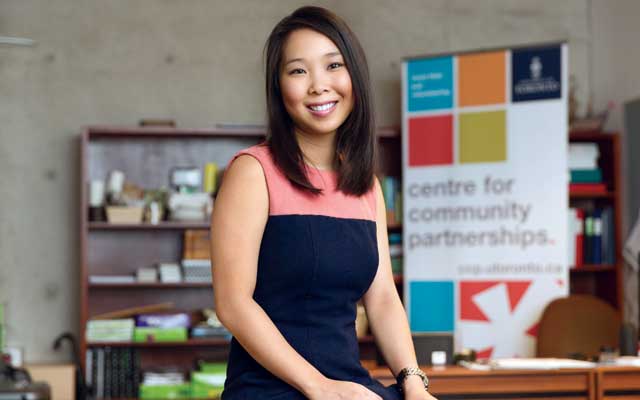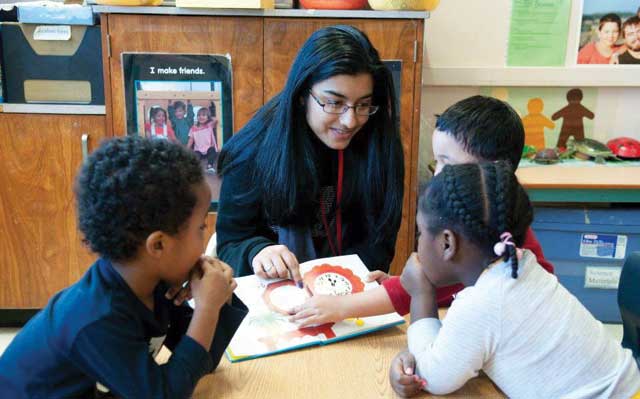
Celebrating 10 years of leadership and civic engagement: U of T's Centre for Community Partnerships
Published: February 1, 2016
“These kids are my neighbours,” says Yusuf Yusuf. “We grew up on the same street, so I feel like I can relate. Kids in the area are saying ‘I’m not going to university.’
“So we brought them to the University, showed them around and said ‘there are people like you here – people making change.’ Right there you see it has an effect on them.”
Yusuf walked into the Centre for Community Partnerships office in his second year at the University of Toronto to speak with someone about how to get involved, and discovered that U of T students were already working in his own neighbourhood.
Now in his fourth year of studying medical radiation sciences, Yusuf serves as co-chair of the Student and Alumni Advisory Committee – a group that evaluates CCP programming and gives feedback to the department – and a CCP student staff outreach coordinator, organizing volunteer mentors at schools in his neighbourhood.

Combining community service with coursework and reflection, the goal of CPP is to use in-class material and co-curricular community-engaged learning to enhance students’ leadership development skills and commitment to civic engagement.
On January 21, more than 150 students, staff, alumni, faculty and community partners gathered to show their appreciation for the decade of important work done at the Centre, whose staff works with faculty and community agencies to develop academic courses taught with a service-learning approach.
President Meric Gertler started the evening off by thanking the hundreds of community organizations that partner with the Centre and have provided placements for more than 18,000 students over the past decade. He also praised the CCP for encouraging students to become civically-minded individuals and advancing his priorities for U of T students.
“Whether it be for a day or a year, all the students involved have been given the opportunity to meet new people and to face unique challenges,” said Gertler (pictured below with CCP students). “They’ve discovered meaningful ways to apply their skills and knowledge to real world scenarios.
“They’ve also gained a new perspective on their academic work and a renewed sense of civic engagement which, as you know, is one of my very highest priorities for this university.”

Alison Chan’s first experience with Service Learning was as an undergraduate and urban studies major, enrolled in INI235 - A Multidisciplinary Introduction to Urban Studies. The course incorporated community-engaged learning by placing its students in local grassroots or non-profit organizations for a period of about eight weeks and she was placed in a community centre in Parkdale as a children’s tutor.
Since then, Chan (pictured below) has gone on to be a national coordinator for Girl Guides of Canada, and has served on the board of directors for three non-profit organizations.

“Many of the residents who came to the centre had fascinating life stories filled with trials and barriers,” she says. “When you take the time to understand each person’s life story, you begin to understand root causes as well as the complexities of common social issues and why the work of these organizations is so important in supporting these residents.
“As clichéd as this may sound, I sometimes wonder how differently my life would have turned out if I had never participated in service learning,” she says. “There is no lecture or textbook that could have given me the skills and insight that I gained through my service learning experience.”
For Angie Hocking, an outreach coordinator at Toronto’s Church of the Redeemer, community service fosters reciprocal relationship.
“We see our role as two-fold: doing this important work while also educating students who are going to be working soon. They’re the people who are going to be making change and they’re the ones who’ll have important voices.
“So if they’ve had experiences like this in their lives, that’s going to change how they look at politics, how they look at their neighbours, how they care for each other. We really see it as integral to our calling and what our work is – to be a place of hope for our community.”

Learn more about the Centre for Community Partnerships



